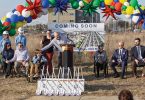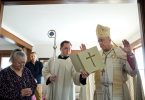by Carolyn Kaberline
TOPEKA — There was a lot of prayer, a lot of theology, and a lot of fellowship shared here at Most Pure Heart of Mary Church March 28-30.
Without a word spoken.
“This was our fifth annual retreat,” said Cathy Mies, pastoral worker for the deaf at Most Pure Heart of Mary. Sponsored by the deaf ministry office of Most Pure Heart, the retreat began Friday evening with an interpreter session, followed by a session for all on Saturday. In total, 45 people attended the retreat, entitled “The Seven Last Words of Christ.”
The retreat, led by Msgr. Glenn Nelson, vicar general of the Diocese of Rockford, Ill., focused on the meaning of both Lent and Jesus’ last words on the cross.
“Everyone was very, very pleased with Monsignor’s gifts of humor, theology, signing ability and being able to relate to young adults in their 20s and the older adults — the oldest being 90 years old,” said Mies. “He related to us all.”
Jeannine Adkins, a member of the deaf community, believes the retreat was very important to those attending for many reasons.
It helped members of the community “grow their faith stronger, spread God’s word to other people and family, [and] grow our relationship with each other,” she said.
“We want to grow the deaf community into a large group in love,” she continued, “to learn how to find our talents for service from God’s gift to us, and to open our hearts.”
Heather Scherer agreed.
“The retreat was nice. I learned some new things about Lent and about Jesus. I love that we had the Mass all in sign language with no interpreters. I feel much more connected to God. I don’t have to look back and forth from the priest to the interpreter. It feels more peaceful.”
Not only did the members of the deaf community attending the retreat find it a special opportunity for spiritual growth, Msgr. Glenn did as well.
“I was moved by the deaf community, as well as the interpreters that joined me in Topeka,” he said. “Their commitment to service, their love of the Lord, their hunger for a deeper faith and the sacrificial giving of their time, talent and treasure to the work of the church were truly inspiring.
“I think I left Topeka more renewed than when I first arrived, but I have come to realize that as a common experience in the ministry of service.”
Although this is only the fifth annual retreat for the group, the deaf ministry at Most Pure Heart of Mary began in 1988 when three deaf Catholics who lived in Topeka approached Sister Ann Albrecht, CSJ, then archdiocesan consultant for the deaf, to find a church in Topeka that would allow Masses to be signed.
“The deaf Catholics were tired of driving back and forth to St. Paul’s in Olathe for their spiritual direction and interpreted Masses,” said Mies. “It was becoming increasingly difficult for them.”
Mies said that Sister Ann came to visit Father Frank Krische, then pastor of Most Pure Heart. It happened that he was not able to make the appointment, so Sister Ann met with a staff member who was the child of deaf parents and so knew sign language. That staff member was Mies.
“Sister Ann took this as a ‘sign from heaven,’” said Mies. The first Mass for the deaf at Most Pure Heart took place in December 1988, with Mies and another interpreter signing the Mass.
“The deaf were so excited,” said Mies. “There were at least eight deaf and their families at that Christmas Midnight Mass. Tears sprang to the eyes of the deaf woman who had originally asked for this service.
“She said, ‘This is the very first Christmas Mass that I’ve understood in my whole life.’
“She was 65 years old.”
From that beginning, Mies explained, the ministry has grown to serve approximately 45 people and their families, with visitors present on many Sundays.
“We started out small with an older population,” said Mies, adding that the first group has since passed away. “We now have deaf who range in age from 25 to 75.”
Although signed Masses and annual retreats are important to the community, more is needed.
“The opportunity to go to confession to a priest who is fluent in sign language is the second most important sacrament next to the Eucharist,” said Mies. “The Mass totally in sign language touches the hearts of the deaf most deeply. It raises their esteem to a higher degree. They are affirmed.”
“The deaf ministry could not serve the deaf without the help of many highly skilled sign language interpreters,” said Pat Richey, consultant for the archdiocesan office for deaf ministry. “These dedicated servants work tirelessly to create the bridge between the deaf and hearing cultures. They are a true blessing.”
While not everyone has the ability to learn another language such as sign language, Msgr. Glenn says the average layperson can still do much by offering encouragement.
“A kind word, a welcoming smile, go a long way with helping those who are deaf feel welcome within the Catholic Church, which is mostly ‘hearing,’” he explained. “I think the average layperson could also help the deaf apostolate by helping fund, develop or just encourage the creation and accessibility of Catholic religious materials. So many Catholic religious visual materials or media that we hearing people have access to are not closed-captioned. Even much of the limited Catholic programming on TV is not captioned.”
“One area that the Topeka deaf apostolate would like to serve is the deaf children in our community,” added Mies. “We know they are ‘out there,’ but they are unknown to us. We’d like to help them learn about Jesus and the church, if parents agree.”
“I would also ask that if someone wants to help in the area of deaf ministry, that he or she pray that the Lord will send into his “silent field” workers who can labor to bring about a rich harvest of faith,” said Msgr. Glenn.






